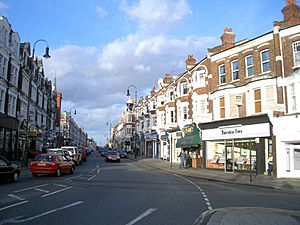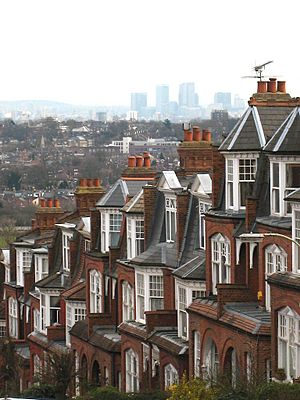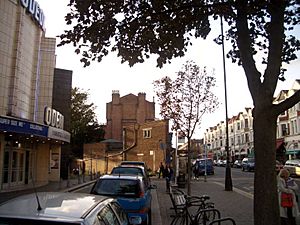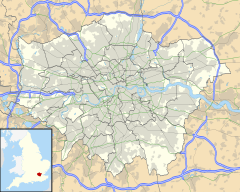Muswell Hill facts for kids
Quick facts for kids Muswell Hill |
|
|---|---|
 Muswell Hill Broadway |
|
| OS grid reference | TQ287897 |
| London borough | |
| Ceremonial county | Greater London |
| Region | |
| Country | England |
| Sovereign state | United Kingdom |
| Post town | LONDON |
| Postcode district | N10 |
| Dialling code | 020 |
| Police | Metropolitan |
| Fire | London |
| Ambulance | London |
| EU Parliament | London |
| UK Parliament |
|
| London Assembly |
|
Muswell Hill is a lively suburban area in north London. It's part of the London Borough of Haringey. The area is built on a hill that rises over 100 meters (about 330 feet) above sea level. It's located about 5.5 miles (9 km) north of central London.
Nearby places include Highgate, Hampstead Garden Suburb, East Finchley and Crouch End. Many streets here are famous for their beautiful Edwardian architecture.
Contents
Muswell Hill's Story

The first records of Muswell Hill are from the 12th century. The Bishop of London owned this land. He gave about 26 hectares (65 acres) to a new group of nuns. The nuns built a chapel there and named it Our Lady of Muswell.
The name Muswell probably comes from a natural spring or well. People believed this "Mossy Well" had special healing powers. A traditional story says that Scottish king Malcolm IV was cured of a sickness after drinking its water. Because of this, Muswell Hill became a popular place for people seeking healing in medieval times.
The River Moselle, which starts in Muswell Hill and Highgate, gets its name from this area. It was once called the Mosa or Mosella. For a long time, until the 1950s, people often said the town's name as "Muzzle Hill."
In the 18th century, Muswell Hill was a small, spread-out village. It had mostly large houses with big gardens. People thought it was a very pleasant village with amazing views. Not much changed by the mid-19th century.
How Muswell Hill Grew

Muswell Hill started to grow much faster at the end of the 19th century. It changed from a few country houses into the London village we see today. This growth happened because Alexandra Palace opened in 1873. Alexandra Palace was a huge entertainment building. It was built on one of north London's gravel hills. It was meant to be like the Crystal Palace in south London.
Alexandra Palace had its own train line from Highgate. There was also a station in Muswell Hill. Another train network served the bottom of Alexandra Palace. This connected to Finsbury Park and Kings Cross stations.
Muswell Hill in the 20th Century
Most of Muswell Hill's development happened in the early 1900s. The streets you see today were planned then. Elegant shopping areas with Edwardian architecture were built. The main shopping area forms three sides of a square. These roads are Fortis Green Road, Muswell Hill Broadway, and Colney Hatch Lane.
At each corner of this shopping area, you'll find a church. There's a United Reformed Church, a Church of England church, a Methodist church, and a Roman Catholic church. A famous art deco Odeon cinema was built in the 1930s.
Until the mid-20th century, there was a train line called the Muswell Hill Railway. It ran from Highgate through Muswell Hill. It ended at a station near Alexandra Palace. There were plans to connect this line to the London Underground Northern line. Some old tube maps even showed it as being built! But these plans were stopped after World War II. The railway line closed in 1954. Today, this old railway path is a popular walking trail called the Parkland Walk.
Muswell Hill is also famous for its music history. In 1964, three young people from Muswell Hill formed the band The Kinks. These were brothers Ray and Dave Davies, and Pete Quaife. The Kinks became one of the most important rock groups of their time. The Davies family home at 6 Denmark Terrace is still visited by rock music fans.
Another musician, Paul Andrew Smith, was born in Muswell Hill in 1950. He helped start the band Wednesday in 1967. They had a big hit song called "Last Kiss."
In 1979, the very first Wetherspoons pub opened on Colney Hatch Lane. In March 2013 and June 2020, Muswell Hill was named one of the best places to live in London by the Sunday Times.
How Muswell Hill is Governed
Muswell Hill was historically part of the Hornsey area. This area was managed by the ancient parish of Hornsey. Parishes originally dealt with church matters. But over time, they also took on local government duties.
In 1903, the Hornsey parish became the Municipal Borough of Hornsey. This was part of Middlesex county. Then, in 1965, Hornsey joined with Tottenham and Wood Green. Together, they formed the modern London Borough of Haringey.
Some northern parts of the N10 postal area are also sometimes called Muswell Hill. These areas were part of the Friern Barnet parish. Later, they became part of the London Borough of Barnet. Today, Muswell Hill is part of the Hornsey and Wood Green parliamentary constituency.
Muswell Hill's Location
Muswell Hill is a mainly Edwardian suburb in north London. It's close to Alexandra Park and Highgate Woods. The main shopping streets, Muswell Hill Broadway and Fortis Green Road, still look very historic. Many of the original building fronts are still there above the shops. The area has a synagogue and six churches. One church has even been turned into a steak house!
 |
Finchley | Colney Hatch | Alexandra Park |  |
| East Finchley | Hornsey | |||
| Hampstead | Highgate | Crouch End |
Schools in Muswell Hill
Primary Schools
- Coppetts Wood Primary School and Children's Centre
- Coldfall Primary School
- Eden Primary
- Hollickwood JMI School
- Muswell Hill Primary School
- Norfolk House Preparatory
- Our Lady of Muswell RC Primary School
- Rhodes Avenue Primary School
- St James C of E Primary School
- Tetherdown Primary School
Secondary Schools
- Alexandra Park School
- Fortismere School
Special Schools
- Blanche Nevile School. This school helps deaf and hearing-impaired children. It's located at Highgate Primary School and Fortismere School.
- TreeHouse School. This school is based at the Pears National Centre For Autism Education.
Getting Around Muswell Hill
Trains and Tube
Muswell Hill doesn't have its own tube or National Rail station.
However, there are several tube stations nearby:
- Bounds Green (
 )
) - East Finchley (
 )
) - Finsbury Park (


 )
) - Highgate (
 )
) - Turnpike Lane (
 )
) - Wood Green (
 )
)
National Rail (![]() ) trains pass east of Muswell Hill. They stop at Alexandra Palace, Hornsey, and Finsbury Park. These trains go to places like Moorgate and Welwyn Garden City. South of Muswell Hill, London Overground (
) trains pass east of Muswell Hill. They stop at Alexandra Palace, Hornsey, and Finsbury Park. These trains go to places like Moorgate and Welwyn Garden City. South of Muswell Hill, London Overground (![]() ) trains serve Crouch Hill station.
) trains serve Crouch Hill station.
Buses
Muswell Hill Broadway and Muswell Hill West have many London Buses. These buses connect the area directly to the City of London and the West End. Buses also go to nearby train and tube stations.
| Route Number | Start | End | Key Destinations |
|---|---|---|---|
| 43 | Friern Barnet | London Bridge | Highgate ( |
| 102 | Brent Cross | Edmonton Green | Bounds Green ( |
| 134 | North Finchley | Warren Street | Highgate ( |
| 144 | Muswell Hill | Edmonton Green | Wood Green |
| 234 | Barnet | Archway | East Finchley ( |
| 299 | Muswell Hill | Cockfosters | Bounds Green ( |
| 634 | Muswell Hill | Barnet | Whetstone |
| W3 | Finsbury Park ( |
Northumberland Park | Alexandra Palace, Alexandra Palace ( |
| W7 | Muswell Hill | Finsbury Park ( |
Crouch End, Crouch Hill ( |
Roads and Cycling
The A504 road goes through Muswell Hill from east to west. Eastbound traffic goes towards Hornsey and Wood Green. Westbound traffic goes to East Finchley and the M1.
The A1 road passes south of Muswell Hill. It carries traffic towards Archway and the City of London. To the north, it crosses the North Circular Road (A406).
There are some cycling paths in Muswell Hill. The Muswell Hill Metro Group wants to bring back an old train line. This line ran between Alexandra Palace and Finsbury Park, through Muswell Hill. They believe it would help reduce traffic and improve air quality.
Muswell Hill's Population
The 2011 census showed that the N10 postal area had a population of 27,992 people. This area includes parts of Friern Barnet.
In the smaller Muswell Hill area of Haringey, 84% of people were white. About 40% said they had no religion, and 40% were Christian. The Jewish population was about 5.3%.
Interesting Places to Visit
- Alexandra Palace
- Alexandra Park
- Golf Course Allotments (a very large area for growing plants)
- The Guy Chester Centre of the Methodist church
- Oliver Tambo Memorial Statue at the Albert Road Recreation Ground
- Muswell Hill United Synagogue
- The Furlong pub in Colney Hatch Lane was the first ever Wetherspoons pub. It was originally called "Martin’s Free House."
Famous People from Muswell Hill
- You can find more people in these categories: People from Muswell Hill and People from Fortis Green.
John Logie Baird was the first person to send moving pictures, which we now call television. The first public TV broadcasts were from nearby Alexandra Palace before World War II. His early system was later replaced by more modern electronic TV. A pub in Fortis Green Road, now called the Village Green, was once named after him.
Musicians Ray and Dave Davies, who started the band The Kinks, grew up in Muswell Hill. Their album Muswell Hillbillies is a clear nod to their childhood here. They supposedly played their very first concert at the Clissold Arms in Fortis Green.
Musician Michael Kiwanuka was born and raised in Muswell Hill. He won the Mercury Prize in 2020 for his album Kiwanuka. His album Love & Hate was number one on the UK albums chart in 2016.
Former KGB agent Alexander Litvinenko lived in Muswell Hill from 2000 until his death in 2006.
The band Fairport Convention started in the Muswell Hill family home of Simon Nicol. The house, called Fairport, is on the south side of Fortis Green.
Prince Alexander Obolensky, a Russian-born England Rugby union star, lived in Muswell Hill for a short time. He died in a plane accident in 1940 while training as an RAF pilot.
Philip Martell, who directed music for Hammer House of Horrors, lived in Woodland Gardens.
Musician, author, and poet Vivian Stanshall lived his last years in Muswell Hill. He died in a fire in his flat in 1995.
Nearby Places
- Colney Hatch
- Crouch End
- East Finchley
- Friern Barnet
- Highgate
- Hornsey
- Wood Green
Nearest Stations
- Alexandra Palace railway station
- Bowes Park railway station
- Hornsey railway station
- New Southgate station
The nearest tube stations are:
- Highgate
- Turnpike Lane
- East Finchley
- Bounds Green
- Wood Green
See Also
- Hornsey (parish) for the local government unit of which Muswell Hill was part from medieval times to 1867
- Municipal Borough of Hornsey for the local government unit of which Muswell Hill was part from 1903 to 1965
 | Janet Taylor Pickett |
 | Synthia Saint James |
 | Howardena Pindell |
 | Faith Ringgold |


